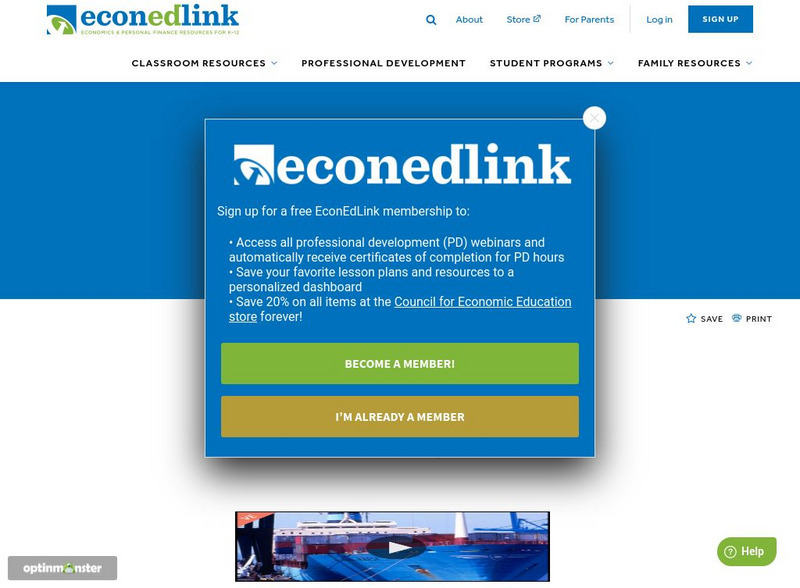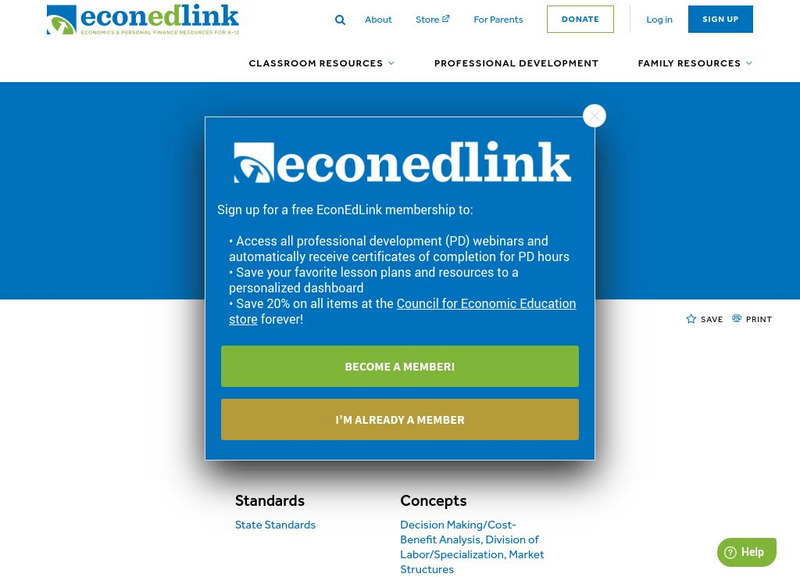Council for Economic Education
Econ Ed Link: Transportation: They Say We Had a Revolution (Part 2)
Advancements in transportation have played a key role in the growth of our nation. U.S.government policies have also had a considerable impact on the development of transport as we know it today. For this series of three lessons, the...
Council for Economic Education
Econ Ed Link: Don't Fence Me Out! (Barriers to Trade)
We tend to see the United States as a country with free trade. Although we do have a great deal of freedom to enter new markets, there are barriers to trade that limit consumer choice. This lesson explores these barriers and how they work.
Council for Economic Education
Econ Ed Link: Peanuts, Pecans, and Peas, Please (Lesson)
Check out this informative site that looks at the world of the peanut. This tiny nut had a great influence on our economy. Find out how George Washington Carver changed the economy of the South with his research on the lowly peanut.
Council for Economic Education
Econ Ed Link: Green Eggs and Economics?
Economic concepts are often found in places students have never considered, like children's literature. In this instructional activity, students will explore the various economic concepts addressed in five of Dr. Seuss' most popular...
Council for Economic Education
Econ Ed Link: An Investigation of Regional Housing Costs
This lesson has young scholars explore differences in regional housing costs, determine the percentage of gross income spent on housing, assess the impact of housing costs on a relocation decision and recognize wages and housing costs...
Council for Economic Education
Econ Ed Link: How E Commerce Influences Consumer Choice
In this lesson students learn decision making skills that will help them become better consumers. As consumers they have a variety of alternatives from which to choose. They learn about the importance of price information in making their...
Council for Economic Education
Econ Ed Link: Old Toy New Market
Students explore the LEGOLAND theme parks and demonstrate an understanding of how new markets can be created and that cultural and social differences can affect these markets.
Council for Economic Education
Econ Ed Link: Supply and Demand, Lessons From Toy Fads.
The concepts of supply and demand and related terms are taught through stories about the toy fads of Hula Hoops and Silly Bandz. In 1958, Wham-O, Inc. began marketing the Hula Hoop in the United States and sales of the Hula Hoops...
Council for Economic Education
Econ Ed Link: Lessons: Community Helpers Are at Your Service
Lesson that introduces students to the people who provide services to the community. Students understand the difference between goods and services, and brainstorm the people who provide services in their community. Includes links to...
Council for Economic Education
Econ Ed Link: Business Ownership: How Sweet It Can Be!
In this lesson plan, students research the three basic types of business organization: sole proprietorships, partnerships, and corporations. Considering the advantages and disadvantages of each, they function as consultants offering...
Council for Economic Education
Econ Ed Link: Transportation: They Say We Had a Revolution (Part 3)
Advancements in transportation have played a key role in the growth of our nation. U.S. government policies have also had a considerable impact on the development of transport as we know it today. For this series of three lessons, the...
Council for Economic Education
Econ Ed Link: The Credit Card Mystery
Credit Cards are a risky business these days, especially for students and those holding multiple cards. Interest rates on credit card balances have always been high relative to other rates, for several reasons. Despite this, there is...
Council for Economic Education
Econ Ed Link: Closing the Gap
The students learn what GDP is. They will learn different measures of GDP as well as how GDP per capita can be used to compare countries. They will also calculate GDP per capita and learn how poorer countries can converge, or close the...
Council for Economic Education
Econ Ed Link: Marketplace: Let's Go Euro!
With the start of the new year in 2002, the 12 members of the European Union launched a single currency across their borders, replacing individual country currencies and singling out the Euro as their one shared monetary denomination....
Council for Economic Education
Econ Ed Link: Traditional Economies and the Inuit
The Inuit people of northern Canada provide an example of a traditional economy. For thousands of years, Inuit parents have taught their children the survival skills needed to survive in the Arctic Circle's severe climate. Students will...
Council for Economic Education
Econ Ed Link: The Economics of Recycling
Students will review the legislation in Japan that requires all consumers to pay a fee for recycling large appliances.
Council for Economic Education
Econ Ed Link: Pop Goes the Housing Bubble
In this activity, students will learn about a speculative bubble within the context of the U.S. real estate market.
Council for Economic Education
Econ Ed Link: Deceptive Advertising: Crossing the Line
Businesses use advertising to tell consumers about the goods and services they are selling. Businesses hope that their advertisements will convince people to buy their products. In this lesson, students examine the ground rules for...
Council for Economic Education
Econ Ed Link: Phillips Curve
This lesson explores the relationship of unemployment to inflation in the 1960s and after. Students will discover the short-run trade-off between inflation and unemployment when unemployment is less than its natural rate. Students will...
Council for Economic Education
Econ Ed Link: Worker Safety the Triangle Fire Legacy
Learners investigate the Triangle Shirtwaist Fire tragedy and how its impact is still felt today. Students identify eerie parallels between the Triangle Fire and more recent workplace events with safety implications. How can future...
Council for Economic Education
Econ Ed Link: What Do You Get for Your $1,818,600,000,000?
Using MS Excel and data from the Bureau of Economic Analysis web site on federal government spending, young scholars will compare the amounts spent on various sectors and programs over a range of years.
Council for Economic Education
Econ Ed Link: What Does the Nation Consume?
This lesson will focus on what the nation consumes and how that is measured by Gross Domestic Product (GDP). In the United States, the goods and services produced for household consumption account for about two-thirds of total output.
Council for Economic Education
Econ Ed Link: There Is Something in the Water
The United States is losing 60,000 acres of wetlands each year. Is this good or bad? Does anyone really want to live in swamps, fens, bogs, and marshes? Or is it better economics to drain the wetlands for other purposes like agricultural...
Council for Economic Education
Econ Ed Link: Professinoal Sports: If You Build It, Will They Come?
Special interest groups are able to have a substantial impact on the political system. Such groups can provide valuable services to individuals and to elected officials. They also can generate substantial benefits to a small minority.






